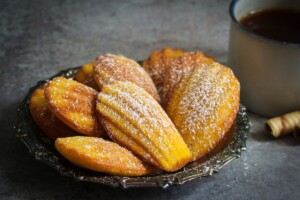THIRD CULTURE KIDS
Children of the Third Culture is a Virtual French Kids Cultural Program which introduces youths to the practice of cultural appreciation, and intercultural comprehension. Through fun virtual activities, children will be transported to discover different cultural practices throughout the world, all while making connections to their own culture. Culture and traditions can vary from country to country, however children will discover that we all share things in common!

What is your “madeleine moment”?
Event Overview
We will meet three French speakers, representing different cultures, who will talk about their own “madeleine moments” and, more specifically, what smell, noise or taste triggers within them the resurgence of a childhood memory.
Their talks will be followed by a cooking workshop, to end the activity on a yummy note! We will prepare the delicious yogurt cake that Julia, our cultural programs director, used to have as a child growing up in France.
Teaching Objectives
Through this activity, participants will:
- Have the opportunity to meet French speakers from different cultures, which will help broaden their understanding of cultural diversity.
- Better understand how culture and environment influence memories and personal experiences.
- Discover the recipe for the legendary yogurt cake and acquire cuisine-related vocabulary.
| Origin of the expression “Madeleine Moment”
In French, the expression ”‘madeleine de Proust” (also referred to in English as “Madeleine Moment”, or “Proust effect”) is used to describe any event that triggers a feeling of remembrance. It can be something simple happening in everyday life, an object, a gesture, a sound or a color, for example, which inevitably brings back or reactivates a memory in a person’s mind, just as a madeleine cake does for the narrator in Swann’s Way (1913), French author Marcel Proust’s first installment of his In Search of Lost Time novel. In Proust’s novel, this is the passage: “And suddenly the memory returns. The taste was that of the little crumb of madeleine which on Sunday mornings at Combray (because on those mornings I did not go out before church-time), when I went to say good day to her in her bedroom, my aunt Léonie used to give me, dipping it first in her own cup of real or of lime-flower tea. The sight of the little madeleine had recalled nothing to my mind before I tasted it; perhaps because I had so often seen such things in the interval, without tasting them, on the trays in pastry-cooks’ windows, that their image had dissociated itself from those Combray days to take its place among others more recent; perhaps because of those memories, so long abandoned and put out of mind, nothing now survived, everything was scattered; the forms of things, including that of the little scallop-shell of pastry, so richly sensual under its severe, religious folds, were either obliterated or had been so long dormant as to have lost the power of expansion which would have allowed them to resume their place in my consciousness. But when from a long distant past nothing subsists, after the people are dead, after the things are broken and scattered, still, alone, more fragile, but with more vitality, more unsubstantial, more persistent, more faithful, the smell and taste of things remain poised a long time, like souls, ready to remind us, waiting and hoping for their moment, amid the ruins of all the rest; and bear unfaltering, in the tiny and almost impalpable drop of their essence, the vast structure of recollection.”¹
|
Details
When: Sunday, February 18, 2024, 10:00 am-11:30 am PST
Schedule of the event:
10:00 to 10:30 am : Meeting with each speaker
10:30 to 11:30 am : Cooking activity
Target audience: Children and teenagers enrolled in the following EFBA French classes: Petits Francophones, Moyens Francophones, Grands Francophones, Middle Schoolers, FSL 1, 2 and 3, FL-C and FL-D, middle schoolers.
Children ages 6+ not enrolled in EFBA’s afterschool program need to have a prior knowledge of French (2 years minimum). Assessment will be required. To join us, participants must be able to:
- Express himself/herself clearly and comfortably in French.
- Easily understand the main ideas in a conversation on a range of topics.
Questions about your child’s level? Email admissions@efba.us before registration.
Led by: our fantastic speakers, and Julia from EFBA Summer Camps
During the visit, you will need:
-
- A reliable computer (or tablet) with both webcam (video) and microphone (audio) capabilities.
- A good Internet connection.
- The following ingredients and utensils for the culinary project:
| List of cooking ingredients and utensils needed to participate
Ingredients:
Cooking utensils:
|
Prices & registration:
Regular price: $19
Special price: Free for students enrolled in EFBA’s afterschool program in 2023-2024.

To Learn More…
Our newest cultural program takes its name from the eponymous must-read book by David Pollock and Ruth van Reken. “Third culture kids (TKCs) is a term describing children who have spent their developmental years in a country that differs from their own nationality. Although TKCs share common experiences with child immigrants due to the bridging of cultures, there is a distinction. TKCs typically do not permanently relocate, or receive legal status in their host country. Additionally, TKCs understand that they will one day leave their new home, enduring a painful separation from friendships, familiarity, and their world.
TKCs are raised in an environment that is never fully the realm of their parents’, or of the one that they currently reside in. Though TKCs lack full immersion into these worlds, they naturally adopt certain practices from both cultures. The results are TKCs that experience connections to both of their cultures, yet feel continually out of place in either one due to their unique multiculturalism.
This estrangement, situated at the merger of two or more cultures, is the “third culture” that connects children living an internationally mobile lifestyle. The third culture creates magical bonds between people reared in this way, transcending nationality, and race as individuals identify with the common experience. Due to their worldviews, TKCs cannot be understood within the limiting framework of a basic definition of culture. Instead, TKCs depict how culture is extremely complex, and includes shared experiences.
In adulthood, TKCs benefit from an awareness of diverse perspectives, and a three-dimensional view of the world. Engrained with a deep interest and respect for all cultures, they appreciate differing perspectives even if they are not shared. Throughout their lives, TKCs find themselves able to build rapport with individuals from around the globe, proving that a less nationality focused, inter-connected, tolerant, world is possible.
Note: The term Third Culture Kid should not be utilized as a blanket term, as certain families may not identify with the expression.
| DATE | DESCRIPTION |
|---|---|
| Saturday, October 30, 2021, 10:00 am-11:30 am PST | On Saturday, October 30th EFBA welcomed French speakers from diverse cultures (South America, Asia, and more) to learn about the different ways of celebrating the dead around the world, in the spirit of discovery. Even if the theme is not the most joyful, our workshop covered this topic with sensitivity and lightheartedness! |
| Sunday, March 6, 2022, 10:00 am-11:30 am PST |
Costume Festivals Around the World On Sunday, March 6th 2022 we will discover costume festivals around the world from diverse cultures and traditions, that share these commonalities: Celebration, joy, and fun! Participants will discover new customs, and learn from French speakers. Let the party begin! |
Is something off? Suggest an edit here

